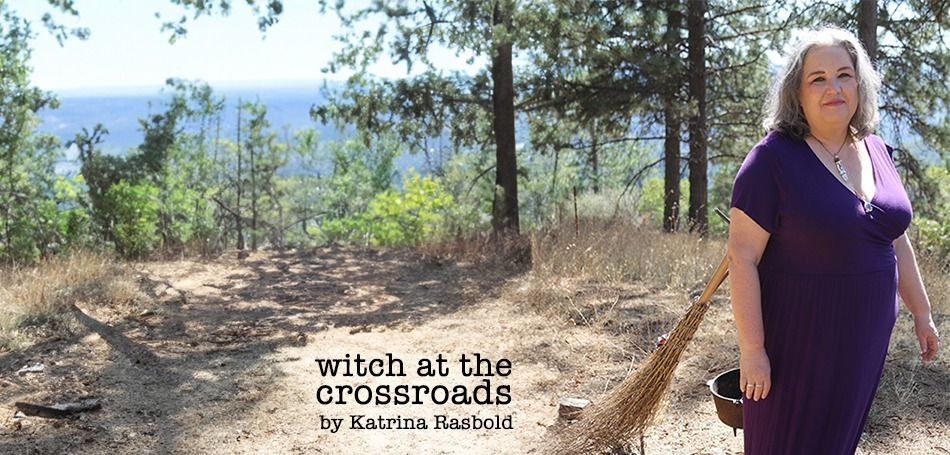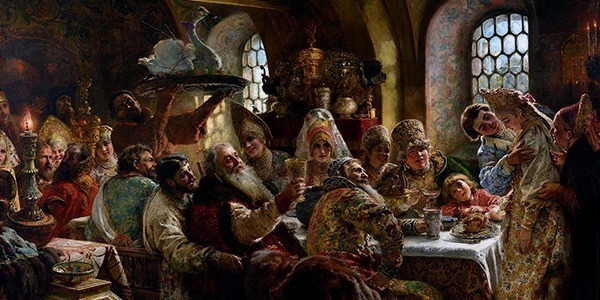
By Katrina Rasbold
Every now and then, a person influential in your field of influence says or writes something so profound that the whole world seems to stop around you as you let the message sink in. This happened to me in February 2018 in San Jose, California when I attended a presentation by one of my favorite writers and lecturers, John Beckett. Every time I sit through any of his classes, I come away with some snippet that finds its way into my future teachings. For this presentation, his topic was “Alliances” and although he made this statement within a different context than I use it in this post, I was stunned (not for the first or the last time) by the raw truth in his words. John said, “Too many people expect a seat at the table when they bring little or nothing to the table.”
As usual, he not only hit the nail on the head, but drove it right into the fencepost.

Later that year, the leader of our Sacramento Pagan Pride Board of Directors asked me to put together an elders panel for the event to host a question and answers session. In this case, they wanted people instrumental in creating the foundation of the Sacramento Pagan community now in existence, so I reached out to the founder of the Sacramento Pagan Pride festival, the founder of the New Wiccan Church, and ten or so others who served our community for decades.
The push back I received from some surprised me. No one voiced objection over who I did invite. People were offended that I did not invite them. John’s words rang in my ears as I thought, “What did you bring to the table?” Of course, there could be important leaders in our community that somehow did not come onto my radar. Sacramento is a big place and although I have worked within the public arena of our Pagan community since 1997, I might not know everyone. Those asking why they were not invited, however, were people I knew well who to my mind, just got here.
This was not some old lady’s foggy sense of time where I failed to consider that they had worked in the community for ten or fifteen years that flew by. I mean they literally just got here and no one knew anything of them five years prior. These were people in my kids’ generation, giving me furtive looks and asking why I did not include them in an elder’s panel.
Just because you roll an impressive number on your character sheet does not mean that you are, in “real life,” a prominent mage. Taking some community college classes on marketing and reading a few books on Witchcraft does not make you an elder in our community. Interestingly, not even being of a particular age makes you a Pagan elder and you could reasonably think it would. Desperately wanting to be an elder or leader in our Pagan community does not make you an elder or leader. Most importantly, the roles of leader or elder in the Pagan community are not self-assigned titles, but titles others bestow on you after you prove yourself and earn the title. You might willingly take on a leadership role when no other leader steps forward, and bless your heart for doing so, but to be an elder, you must also put in your time.
What does make an elder and a leader?
Being a leader and/or elder is more than reading books and developing a fundamental, working knowledge of Paganism. A leader and/or elder must serve their community in a noticeable, trackable, and verifiable way. A person, no matter how gifted, well-read, or motivated, does not come in, work hard for a year or two in the community, and get to wear the global leadership crown. It takes time, integrity, and service.
In the military, there are two phrases pertinent to this conversation: “Time in grade” and “time in service.” “Time in grade” is how long you have served at your current rank. “Time in service” is the total time you have served in your branch of the military.
Putting in the time through community service is a huge factor in leadership. Proving yourself to be a person who treats others with dignity and respect consistently and over years of service contributes to becoming a community leader, as does establishing trust and reliability over time. Even the combination of time in grade and time in service does not guarantee the status of elder or community leader. It should, and it would, if people always conducted themselves with integrity.
When you land in a position of leadership, your dirty laundry dries on a public clothesline, therefore, your side of the street had better be pristine. We all know community leaders who fall into dramatic screaming fits as soon as someone disagrees with them or fails to follow their exact orders. We know community leaders who are sexual predators. We know community leaders who vehemently demand respect, their fingers flying furiously over the social media keyboard when the community does not genuflect to the level they feel they deserve. These are not community leaders. These are tyrants. These are playground bullies who found their niche to continue bullying as adults. These are wounded people who wound others, using the mask of leadership to access their victims.
People such as this have time in grade and time in service, but their service record is dishonorable and everyone in the community knows it. Those who go into Pagan leadership for reasons of ego are quickly revealed as such, regardless of how involved they may be in the community or how long they stick around. Sadly, some followers admire these abusers and see the abuse as an entitlement of rank, allowing the cycle to continue. This is the equivilent of “I was beaten as a child and I turned out OK.”
No. No, you did not.
Quality leaders and elders are the ones you go to when you want good advice. Quality leaders and elders might no longer be able to do the work, but they can tell you the pitfalls to avoid and how to navigate the treacherous waters of public events. Good leaders do not demand the title and respect of leadership or even necessarily seek it out. They earn it.
So how do you get a seat other than to step up and demand it?
How does a leader earn respect and elderhood? The answer is time in grade and time in service coupled with an exemplary service record.
“But nobody’s perfect!” they cried. “Everyone makes mistakes!”
Such true words. The operative point to consider is that how a person responds when it is their turn to be confronted by their errors is just as significant as the fact that they made an error in the first place. Of course, leaders are humans and make mistakes but a true leader owns their mistakes and atones accordingly. They do not keep spinning and bending the story until they create a version that renders them blameless, nor do they offer a tiny splinter of accountability to distract their accusers from the woodpile of evidence behind them.
If you want to find your true community leaders, look for traits such as accountability, willingness to do the work, reliability and follow-through, accountability, humility, focus, truthfulness, compassion, dependability, accountability, integrity, and did I mention accountability?
Most people, I believe, struggle with self-awareness. Some are oblivious to how their behaviors affect others or how the public perceives them. Some, sadly, do not care how anyone feels about their destructive behavior. Others worry over much about what others think to the point that they rarely act with any level of true authenticity. Many of the greatest offenders will read this and say, “Man, I’m sure glad I don’t act like that” while those who are terrified of being negatively perceived by their community may become even more paranoid. This cognitive dissonance keeps most people from accurately assessing public perception of their standing or their behavior. This means that the safest approach is to conduct ourselves with integrity in such a way that we can live a transparent and authentic life. The rest will take care of itself. Trust me, the Pagan community clamors for effective and honorable leaders. You will not be left behind or overlooked provided you are willing to step up when asked and serve the community with a kind and willing spirit.
Every year, new people elbow their way to the grown-up table, demanding to be important, to be heard, and to be recognized as community leaders. In a place and time where there is nothing new under the sun, they push forward with NEW and INNOVATIVE ideas that will be the SALVATION of what they perceive as a struggling Pagan community. They cleverly identify the problems and imagine themselves and their ideas to be the magic band-aid that will heal all the wounds, even when existing leaders know of the issues and are actively working to resolve them. They rush into an existing project full of new ideas and ready to save it from itself. To be clear, this is not limited to younger people. This also includes older folks who come out of the woodwork reciting an unprovable legacy and want recognition as a leader when we never saw them lead anyone.
To ensure and establish a good fit, newcomers of any age should take the time to watch, to learn, and to listen. They must put in the time getting to know the community from the inside out rather than observing from the outside and pushing their way to the front of the crowd, confident that they are the smartest voice in the room. Who knows? They might be! It is, however, important to take time to read the room before making such a determination. Deciding for yourself that you are the smartest person with all the best solutions is rarely well-met by others.

What can we do as a community?
As I said, Pagans are often thrilled to find new or even elsewhere experienced leaders willing to help create a cohesive and magical network of healthy connection amongst our community. Most people, I have found, prefer to be led than to lead because of the time, energy, patience, and exposure required for leadership. The need for reliable help and quality leadership can cause us to quickly accept people whose only real talent is to assert themselves forward. When people have great ideas and seem motivated, we welcome them with open arms, sometimes without giving them an opportunity to establish a history of follow-through. We need time to determine what kind of people they are when they are not selling themselves. That is not to say that we should cast a suspicious eye to anyone who volunteers to participate in community activities. Goddess knows we need as many helpful hands as we can get. That being the case, however…
- When someone appears out of nowhere and aggressively pushes their agendas into the community as if they are the second coming of Pagandom, far from ignoring them, pay attention.
- When a person insists that they abhor drama but always have drama around them everywhere they go, pay attention.
- When divisiveness and conflicting stories follow a person throughout the community as they leave a trail of bodies, damaged businesses, and broken relationships in their wake, pay attention.
- When someone comes to you with a long list of stories about people who did them wrong, pay attention. You will likely be their next story on that ever-growing list.
- When someone comes into the community and attempts to create discord among the existing Pagan leaders in the community or tries to undermine those leaders, pay attention.
To a Pagan leader, someone who presents with apparent motivation, experience, and talent is a balm to the jagged nerves. It is exciting and relieving at the same time to have someone want to help because those folks are few and far between. It is intoxicating and the urge to use that resource to its fullest is tempting beyond reason. Our community has plenty of people willing to enjoy the festivals and rituals and public gatherings and far too few willing to put in the work that makes them happen. When leaders see someone excited and eager to help, the inclination is to allow them to do all they are willing to do. Unfortunately, this sometimes leaves Pagan leaders vulnerable if they give away too much power too soon. Pay attention.
- Do not be afraid to ask questions such as, “I’m sorry, who are you again?” especially if someone you do not recognize behaves as if they were always there.
- Notice and bookmark red flags that come up that you feel inclined to dismiss out of kindness or desperation.
- Invest your respect for and your devotion to any person carefully and with discernment without allowing desperation, loneliness, or fatigue to cloud your better judgment.
- Notice how often you see a person actively listening to others around them versus how often you see them talking.
- When someone’s conversations feel “culty” or have an atmosphere of “us vs them,” pay attention.
- Try to narrow the cognitive dissonance gap and maintain objective awareness of what you bring to the table.
When someone new to the scene speaks disparagingly about an established person in the community and that accusation seems out of character or unlike the person being discussed, pay attention. People sometimes create discord in a community by taking a tiny grain of truth and building a huge story around it so that what they are saying does not seem completely impossible. This frequently causes others to believe contrived, extrapolated, or exaggerated accusations that are untrue. “Divide and conquer” is a strategy people often use without even realizing they are doing it. When someone you do not know well attempts to malign others from the community to you, say, “You know, I am going to stop you right there,” and graciously redirect the conversation. Reach out to people you know to be reliable and quickly verify information that seems sketchy. Do not allow misperceptions, even minor ones, to spread or linger.
Consider the notion of “methinks thou dost protest too much” when people go public verbally or through social media with verbose overexplaining of perceived slights. People tend to overexplain to convert, not to defend. If a person is unable to stand on their own integrity, it usually means they have established no integrity on which to stand.
If YOU are the one who feels frustrated waiting for your seat at the table, relax. Chill. We still love you. The community needs competent, motivated, and eager participants just as much as it needs competent, experienced, and vetted leaders. You are the next generation and the life’s blood that will keep the community growing, improving, and developing. Find comfort in that until it is your turn at the table. Invest the time and hard work and the community will embrace you warmly. You will be at that grown-up table in no time, likely sooner than you expect. PHOTOS FROM THE PUBLIC DOMAIN
PHOTOS FROM THE PUBLIC DOMAIN
 Katrina Rasbold is a professional Witch, published author, priestess, and editor of Green Egg Magazine. She and her husband, Eric, are the creators of the CUSP spiritual path and owners of Crossroads Occult. She and Dahlia Rose host the popular livestreamed video broadcast “Crossroads of Cognizance” most Thursday afternoons. You can reach her through www.katrinarasbold.com.
Katrina Rasbold is a professional Witch, published author, priestess, and editor of Green Egg Magazine. She and her husband, Eric, are the creators of the CUSP spiritual path and owners of Crossroads Occult. She and Dahlia Rose host the popular livestreamed video broadcast “Crossroads of Cognizance” most Thursday afternoons. You can reach her through www.katrinarasbold.com.